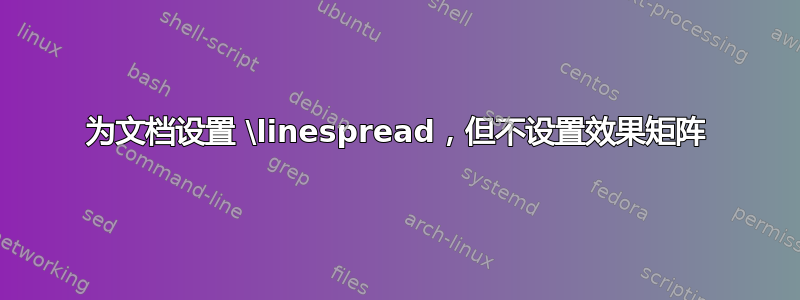
这是我的页面,使用了\linespread2。
\documentclass{article}
\usepackage{geometry}
\geometry{
a4paper,
margin=20mm,
}
\usepackage{bm}
\usepackage{amsmath}
\newcommand{\Mt}[1]{\bm{\mathrm{#1}}}
\linespread{2}
\begin{document}
\section*{Question 1}
We input the coefficients into coefficient matrix $\Mt{A}$, the unknowns into vector $\Mt{x}$ and the right hand sides into vector $\Mt{b}$
\begin{align*}
\Mt{A}=
\begin{pmatrix}
2&-1&0\\
-2&2&5\\
4&-4&-3
\end{pmatrix}
\end{align*}
\end{document}
但对于矩阵来说,它会产生一个分散的矩阵
是否可以设置全局展开的线,但不能设置矩阵或数组的线?
答案1
该参数\arraystretch是您需要处理的:它是数组和一般表格材料中的行间空间的进一步乘数。
如果将其设置为扩展因子的倒数,就完成了。
\documentclass{article}
\usepackage{geometry}
\geometry{
a4paper,
margin=20mm,
}
\usepackage{amsmath}
\usepackage{bm} % load after amsmath
%\newcommand{\Mt}[1]{\bm{\mathrm{#1}}}
\newcommand{\Mt}[1]{\mathbf{#1}} % much simpler!
\linespread{2}
\renewcommand{\arraystretch}{0.5} % the reciprocal of 2
\begin{document}
\section*{Question 1}
We input the coefficients into coefficient matrix $\Mt{A}$, the unknowns into
vector $\Mt{x}$ and the right hand sides into vector $\Mt{b}$
\begin{equation*}
\Mt{A}=
\begin{pmatrix}
2&-1&0\\
-2&2&5\\
4&-4&-3
\end{pmatrix}
\end{equation*}
\end{document}
我还做了一些带有注释的修正;另外,当显示单个方程式时,不要用align它来代替。equation




